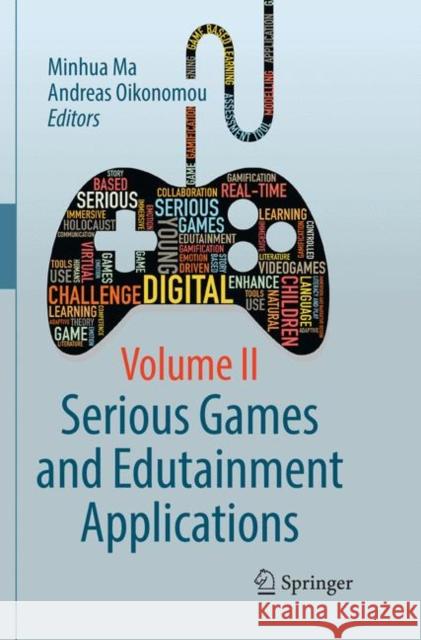Serious Games and Edutainment Applications: Volume II » książka



Serious Games and Edutainment Applications: Volume II
ISBN-13: 9783319847085 / Angielski / Miękka / 2018 / 702 str.
Serious Games and Edutainment Applications: Volume II
ISBN-13: 9783319847085 / Angielski / Miękka / 2018 / 702 str.
(netto: 885,92 VAT: 5%)
Najniższa cena z 30 dni: 886,75
ok. 16-18 dni roboczych.
Darmowa dostawa!
Foreword.- Section I: Serious Games and Emotion.- Rising to the Challenge: An Emotion-Driven Approach Towards Adaptive Serious Games.- The Emotion Detectives Game: Supporting the Socio-Emotional Competence of Young Children.- Section II: Games for Music Education.- Designing Music Games and Mobile Apps for Early Music Learning.- Shake and create: Re-Appropriating Video Game Technologies for the Enactive Learning of Music.- Section III: Games for Medical Education and Training.- Digitisation of Anatomical Specimens and Historical Pathology Specimens for Educational Benefit.- Towards the Development of a Virtual Reality Simulator with Haptic Force Feedback for Training in Stereotactic Brain Biopsies.- Interaction and Communication in an Immersive Learning Game: The Challenges of Modelling Real-Time Collaboration in a Virtual Operating Room.- Oculus Surgery : Application of Oculus Rift and Leap Motion in Surgical Training.- Creation of e-tutorials to enhance medical student Anatomy learning experience using Articulate Storyline 2.- Section IV: Game Based Learning in Various Subjects.- Tipping the Scales: Classroom Feasibility of the Radix Endeavor Game.- Al-Kimia: How to Create a Video Game to Help High-School Students Enjoy Chemistry.- Designing virtual worlds for learning history: the case-study of NetConnect project.- Section V: Serious Games for Children and Adolescents.- Intelligent Behaviors of Virtual Characters in Serious Games for Child Safety Education.- Using Serious Games to (re)train Cognition in Adolescents.- Promoting Healthy Adolescent Lifestyles through Serious Games: Enacting a Multidisciplinary Approach.- Digital Games in Early Childhood: Broadening Definitions of Learning, Literacy and Play.- Section VI: Serious Games for Serious Topics.- Walk a Mile in My Shoes”: A Virtual World Exercise for Fostering Students’ Subjective Understandings of the Experiences of People of Color.- Question-answering Virtual Humans based on Pre-recorded Testimonies for Holocaust Education.- A Driving Simulator Designed for the Care of Truckers Suffering from Post-Traumatic Stress Disorder.- Using Serious Games to Establish a Dialogue Between Designers and Citizens in Participatory Design: The Architectural Portal of People’s Narratives.- Section VII: Gamification.- How to Use Game Elements to Enhance Learning: Applications of the Theory of Gamified Learning.- Why Gamification Fails in Education and How to Make it Successful: Introducing 9 Gamification Heuristics based on Self-Determination Theory.- Section VIII: Assessment of Serious Games.- Factors Associated with Player Satisfaction and Educational Value of Serious Games.- Learning Analytics as an Assessment Tool in Serious Game: A Literature Review.- Section IX: Narrative Design.- Creating Story-Based Serious Games Using a Controlled Natural Language Domain Specific Modeling Language.- Immersion and Narrative Design in Educational Games Across Cultures.- Section X: Review and Methodology.- “I Just Don’t Know Where to Begin”--Designing to Facilitate the Educational Use of Commercial, Off-the-Shelf Videogames.- The Role of the Teacher in Game-Based Learning: A Review and Outlook.- Building Context-Aware Gamified Apps by Using Ontologies as Unified Representation and Reasoning based Models.
Minhua Ma is a Professor of Digital Media & Games in the School of Art, Design and Architecture at the University of Huddersfield and currently serves as the Head of Department of Art & Communication too. As a world-leading academic, involved with the emergence of serious games as a field of academic study, she has widely researched and published on topics such as serious games for education, medicine and healthcare, Virtual and Augmented Reality and Natural Language Processing.
Andreas Oikonomou is a Senior Lecturer at Nottingham Trent University where he teaches computer science, human-computer interaction (HCI) design and project management. His current research interests include applied research projects in serious games, interactive technologies, biomedical computing and artificial intelligence.
With the continued application of gaming for training and education, which has seen exponential growth over the past two decades, this book offers an insightful introduction to the current developments and applications of game technologies within educational settings, with cutting-edge academic research and industry insights, providing a greater understanding into current and future developments and advances within this field.Following on from the success of the first volume in 2011, researchers from around the world presents up-to-date research on a broad range of new and emerging topics such as serious games and emotion, games for music education and games for medical training, to gamification, bespoke serious games, and adaptation of commercial off-the shelf games for education and narrative design, giving readers a thorough understanding of the advances and current issues facing developers and designers regarding games for training and education.
This second volume of Serious Games and Edutainment Applications offers further insights for researchers, designers and educators who are interested in using serious games for training and educational purposes, and gives game developers with detailed information on current topics and developments within this growing area.
1997-2026 DolnySlask.com Agencja Internetowa
KrainaKsiazek.PL - Księgarnia Internetowa









